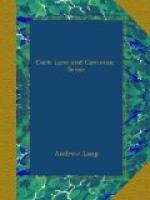We now come to the certainly honest evidence of the Pere Lejeune, the Jesuit missionary. In the Relations de la Nouvelle France (1634), Lejeune discusses the sorcerers, who, as rival priests, gave him great trouble. He describes the Medicine Lodge just as Kohl does. The fire is put out, of course, the sorcerer enters, the lodge shakes, voices are heard in Montagnais and Algonkin, and the Father thought it all a clumsy imposture. The sorcerer, in a very sportsmanlike way, asked him to go in himself and try what he could make of it. ’You’ll find that your body remains below and your soul mounts aloft.’ The cautious Father, reflecting that there were no white witnesses, declined to make the experiment. This lodge was larger than those which Kohl saw, and would have held half a dozen men. This was in 1634; by 1637 Pere Lejeune began to doubt whether his theory that the lodge was shaken by the juggler would hold water. Two Indians—one of them a sorcerer, Pigarouich, ’me descouvrant avec grande sincerite toutes ses malices’—’making a clean breast of his tricks’—vowed that they did not shake the lodge—that a great wind entered fort promptement et rudement, and they added that the ‘tabernacle’ (as Lejeune very injudiciously calls the Medicine Lodge), ’is sometimes so strong that a single man can hardly stir it.’ The sorcerer was a small weak man. Lejeune himself noted the strength of the structure, and saw it move with a violence which he did not think a man could have communicated to it, especially not for such a length of time. He was assured by many (Indian) witnesses that the tabernacle was sometimes laid level with the ground, and again that the sorcerer’s arm and legs might be seen projecting outside, while the lodge staggered about—nay, more, the lodge would rock and sway after the juggler had left it. As usual, there was a savage, Auiskuouaskousit, who had seen a juggler rise in air out of the structure, while others, looking in, saw that he was absent. St. Theresa had done equal marvels, but this does not occur to the good Father.




